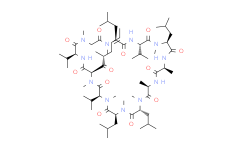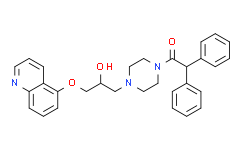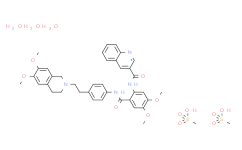| 中文名称: | Valspodar | ||||
|---|---|---|---|---|---|
| 英文名称: | Valspodar | ||||
| 别名: | Zosuquidar PSC833 | ||||
| CAS No: | 121584-18-7 | 分子式: | C63H111N11O12 | 分子量: | 1214.62 |
| CAS No: | 121584-18-7 | ||||
| 分子式: | C63H111N11O12 | ||||
| 分子量: | 1214.62 | ||||
基本信息
|
产品编号: |
V10153 |
||||
|
产品名称: |
Valspodar |
||||
|
CAS: |
121584-18-7 |
储存条件 |
粉末 |
-20℃ |
四年 |
|
分子式: |
溶于液体 |
-80℃ |
6个月 |
||
|
分子量: |
1214.62 |
-20℃ |
1个月 |
||
|
化学名: |
|||||
|
Solubility (25°C): |
|||||
|
体外:
|
DMSO |
|
|||
|
Ethanol |
|
||||
|
Water |
|
||||
|
体内(现配现用): |
|
||||
|
<1mg/ml表示微溶或不溶。 |
|||||
|
普西唐提供的所有化合物浓度为内部测试所得,实际溶液度可能与公布值有所偏差,属于正常的批间细微差异现象。 |
|||||
|
请根据产品在不同溶剂中的溶解度选择合适的溶剂配制储备液;⼀旦配成溶液,请分装保存,避免反复冻融造成的产品失效。 |
|||||
制备储备液
|
浓度
溶液体积 质量 |
1mg |
5mg |
10mg |
|
1mM |
0.8233mL |
4.1165mL |
8.2330mL |
|
5mM |
0.1647mL |
0.8233mL |
1.6466mL |
生物活性
|
产品描述 |
一种选择性的P-糖蛋白抑制剂,已被用作化学增敏剂用于实验性癌症的研究。 |
|
靶点 |
P-glycoprotein |
|
体外研究 |
Valspodar (PSC 833) has no cytotoxicity effects at up to the concentration of 0.75μg/mL.Valspodar (0.25,0.5 and 0.75μg/mL) and DOX-L are added to the DOX resistant cells,and cell kill efficacy of MDR cell type increases significantly when valspodar is administered alongside DOX-L.Valspodar (0.5 and 0.75μg/mL),in combination with all concentrations of DOX,are most toxic and kill more than 70% of the resistant cells.Pretreatment with PSC833 decreases the IC50 value of NSC 279836 in MDA-MB-435mdr cells to 0.4±0.02μM in MDR cells and almost completely reverses the resistance of MDR cells to NSC 279836. |
|
体内研究 |
valspodar (10mg/kg,o.p.) exhibits minimal blood-cell partitioning as reflected in its low mean blood-to-plasma ratio of approximately 0.52.Valspodar displays properties of slow clearance and a large volume of distribution.Valspodar shows properties of low hepatic extraction and wide distribution,similar to that of its structural analogue CsA.Preadministration of PSC833 to mice increases NSC 279836 fluorescent intensity in MDR tumor to 94% of that in the wild-type tumors. |
推荐实验方法(仅供参考)
|
细胞实验: |
|
|
The in vitro cytotoxicity of various formulations against T47D/TAMR-6 cells is investigated by MTT assay.A 104 T47D/TAMR-6 cells are cultured in 96-well plate containing RPMI medium and incubated overnight to allow cell attachment.After 48 hours incubation,fresh medium containing serial concentration of various drug formulations,including free DOX,DOX-L,mixture of DOX-L and free Valspodar (PSC 833),mixture of DOX-L and PSC-L and DOX/PSC-L are added.The plates are then incubated for an additional 48 hours before washing with normal saline followed by adding MTT solution (0.5mg/mL) to each well,and incubated for 4 h at 37℃.Then,the medium is removed,and DMSO is added to dissolve the formazan crystals.The plates are mildly shaken for 10 min to ensure the dissolution of formazan.The formazan dye is measured spectrophotometrically using microplate reader at 570nm with reference standard of 690nm as described before. |
|
|
动物实验: |
|
|
Male Sprague–Dawley rats (250-350g) are housed in temperature-controlled rooms with 12h of light per day.The animals had free access to food and water prior to experimentation.Rats are divided into two groups:one group (n=6) receives intravenous dose (5mg/kg) of valspodar and the other group administered valspodar orally (10mg/kg).Stereoselective pharmacokinetics of desbutylhalofantrine,a metabolite of halofantrine,in the rat after administration of the racemic metabolite or parent drug.After surgery,the rats are transferred to their regular holding cages and allowed free access to water,but food is withheld overnight.The next morning,rats are transferred to the metabolic cages and dosed with valspodar. |
|
本计算器可帮助您计算出特定溶液中溶质的质量、溶液浓度和体积之间的关系,公式为:
质量 (g) = 浓度 (mol/L) x 体积 (L) x 分子量 (g/mol)
摩尔浓度计算公式
用本工具协助配置特定浓度的溶液,使用的计算公式为:
开始浓度 x 开始体积 = 最终浓度 x 最终体积
稀释公式
稀释公式一般简略地表示为:C1V1 = C2V2 ( 输入 输出 )










